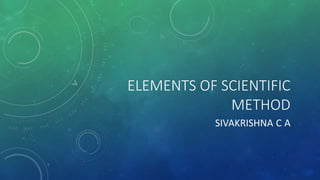
Elements of scientific Method.pdf
- 2. ELEMENTS OF SCIENTIFIC METHOD • There are two aspects in the scientific method • 1, Technical aspect (observation , Experimentation ) • 2, Logical aspect (Analysis and synthesis, Analogy, induction, deduction, formulation of hypothesis)
- 3. TECHNICAL ASPECTS • The technical aspects comprise of observation and experimentation. • Observation • To observe something is to one’s senses and perceptive powers to objects, events, or circumstances. Merely looking at or seeing is not observing. • Observation is watching things with some purpose or objective. • A good observer is described as a person who has learned to use his senses of touch, sight, smell, hearing, and taste is an intelligent and alert manner. • In science quantitative observations are more useful than more qualitative observations.
- 4. OBSERVATION • Imperfections of our sense organs may affect adversely the process ofobservation. • sense organs is easily deceived and we do not see the all event. • For eg, when a motor cycle and a bus collide, we find it difficult to keep and facts and inferences distinctly apart.” •
- 5. OBSERVATION • Errors creep in observations, because observers frequently miss things and sometimes indulge in fake observations. Observations should be accurate, precise, and clear and a keen observer should be impartial, patient and should proceed with great caution. • Powers of observations can be cultivated. • For this, the habit of watching things with an active inquiring mind, objective based consistent work and an alert mind quote sensitive to unexpected opportunities are necessary. • For successful observations, what is to be observed must fall within the range of human sense organs, must be accessible and not obscured by any distorting medium and observers sensory equipment must be in good condition. • He should have background experience, should be free from personal prejudices and must be cautions of errors creeping in.
- 6. EXPERIMENTATION • Observations may be natural and artificial. • The types of observation of phenomena under controlled condition-condition produced or arranged by human action is called artificial observation or experimentation • An experiment has two variables, independent variable, and the dependant variable. Independent variable is the variable that is altered or manipulated by the investigator while the dependent variable is that upon which the changes are observed.
- 7. EXPERIMENTATION • Collection of data is very important step in experimentation • Data are classified in to two type, primary data and secondary data • Primary data are the actual information which is received by the researcher from the actual filed of researcher. these data are attained by means of questionnaires and schedules. In some fields, primary data are collected through observation and interview. • Secondary data are the information which are attained indirectly. These data are obtained from published and unpublished material. Secondary data are gathered from information collected from individuals and institutions through personal diaries, letters, survey documents, books, manuscripts, photography, newspapers, magazine etc.
- 8. ANALYSIS AND SYNTHESIS Analysis • Split to separate things. • Unknown to known • In all modes of scientific thoughts are made use of. Synthesis • Place together things • Known to unknown • In all modes of scientific thoughts are made use of.
- 9. ANALOGY • primitive type of inference • it proceeds from particulars to particulars or from general to general. • It can afford suggestions, but cannot establish truth. • But it has served as clues to many inventions. • Similarly, the atomic structure was suggested by the planetary system. • In Biology, the classification of many animals and plants are by way of finding analogous phenomenon.
- 10. INDUCTION • It proceeds from particulars to general and more advanced than other modes • For example, 1, • a-A man is mortal, • b- A man is mortal, • c-A man is mortal, • there for all men are mortal • 2, a-sulphuric acid turns blue litmus red. • b-Hydrochloric acid turns blue litmus red, • c-Nitric acid turns blue litmus red, • therefore, all acids are turn blue litmus red • 3, Hydrogen gas expands on heating • Oxygen gas expands on heating, • Carbon dioxide gas expansion heating; • there for all gases are expands on heating • of influence.
- 11. DEDUCTION • Most advanced type of inference. • Way of extending well-established laws to instances. • It proceeds from known to unknown and from general to particular. • For example, • 1-All men are mortal.” A” is a man there for he is mortal. • 2, All arsenic compounds are poisonous. Arsine is an Arsenic compound and therefore it must be poisonous.
- 12. FORMULATION OF HYPOTHESIS • A tentative suggestion for the solution of a problem. • Necessarily associated with doubt, but with doubt of a negative rather than a positive kind. • Accepted only as mental tools which would help to form more substantial explanations. • They are to be accepted, modified, or totally abandoned in the light of further evidence.
- 13. FORMULATION OF HYPOTHESIS • It is here where the ability of the scientist really reflects. • The formation of the hypothesis helps the process of investigation very much. • They can suggest inconsistencies in thinking and also irrelevancies in the design of experiments.
- 14. CHARACTERISTICS OF GOOD HYPOTHESIS Precise enough to become the solution to a specific problem, yet sufficiently inclusive to yield knowledge that will help the investigator to handle new and related problems Stated so that it can be tested or verified either immediately or eventually. A clear picture of what the end -product of the investigation will be. Logically consisted, free of ambiguity and contains no tacit or interlocking assumptions. The simplest hypothesis that is adequate to embrace the problems.
- 15. THANK YOU